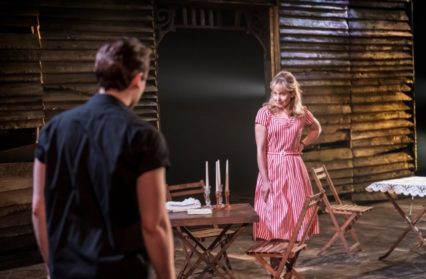Grace Patrick reviews Theatr Clwyd’s revival of Tennessee Williams’ Orpheus Descending, transferred to the Menier Chocolate Factory in London.

It’s well documented that much of Tennessee Williams’ writing was, in a round-a-bout way, autobiographical. That’s not to say that he only wrote his own life story, but characters who look and sound and feel like him and his family are threaded through his work. Their fingerprints are always there, waiting for someone to place a hand where he placed his.
Maybe that’s why, as Orpheus Descending by Theatr Clwyd continues its slow creep into the dark, it becomes increasingly heartbreaking. It’s straightforward to write about running away, perhaps especially for Williams, who spent so much of his life reinventing who he’d been before. There’s something more flitting and harder to grasp in writing about the act of staying still, of trying to put down roots when you barely know what that means. So many of Tennessee Williams’ male leads want to escape, this one just seems to want to rest. It’s infuriating to watch Val try to do right by people, only to be constantly shut down; it’s as if he wants peace, but peace doesn’t want him. Tennessee Williams chose to take such an evocative, powerful character as Orpheus, and to place his representative into a world that he can’t possibly survive.
Like the trappings of the tenement building in The Glass Menagerie, we never step outside of an obscure dry goods store. Unlike the tenement, however, this becomes something more like a sanctuary. The evil of the world is outside and upstairs and round the corner, but only in the final stages of the play does it really enter the store. Its clues are there of course; the sounds of violence and silent threats of domestic abuse can’t be kept out by averted eyes and distracted ears, too busy with the scandals and scapegoats of a very small world to notice something much more pervasive and deeply, deeply evil.
If it weren’t for Tamara Harvey’s direction and a stageful of insightful, communicative performers, the first half of this play would drag. There’s a lot of set up, and the process of building the story is almost arduously slow. It would be easier for a director to instinctively try to speed this up, to hurry the play along and get it where it needs to be. The alternative is a revelation. By allowing the play to bask in its snail’s pace, it becomes a horrible game of painstakingly placing characters where they need to be in order to be knocked aside. There’s a grim purposefulness to it, cemented into place by the hypocrisy and bitterness of this small town. A sheriff claims to dislike violence, and a convict is ripped apart by dogs. Perhaps there’s no good in this town, and perhaps that’s why the play ends how it does. With that said, I can’t help but feel that, somehow, characters are punished not just for dreaming of something ‘other’, but simply for not fitting into an almost ridiculously specific mould. This punishment isn’t solely inflicted by other characters, it’s more like the world comes crumbling down.
Finally, that staging and that light. Trying to support the text with obviously ambitious stagecraft could have had the opposite effect and crush it altogether. Just a touch of that magic, however, really allows the play to blossom. The moments in which characters are silhouetted in moonbeams and shadowy dusk light will stay with me because they were completely beautiful.
Orpheus Descending is a gorgeous, delicate play. It would be hard to understate the raw creative energy that it must have taken to start with a text described long ago by the New York Times as “one of Mr Williams’ pleasant plays”, and to end with such a perceptive critique of humanity, society and all that that entails. It trips over itself a little at times – the hallmarks of Williams’ writing are present, although they’re somewhat diluted by his not yet fully-flourished writing form. It’s good to see one of his less well-known plays revived, especially in such capable hands.
Theatr Clwyd‘s website has information about their future productions.
The Menier Chocolate Factory in London has regular performances.
Grace Patrick contributes regularly to Wales Arts Review.
Orpheus Descending











